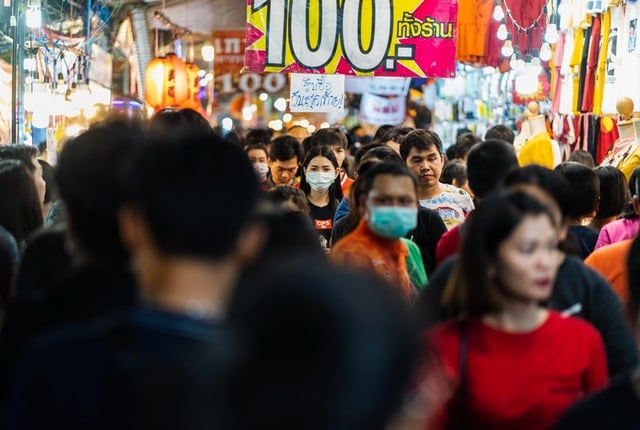“Interdependence: the dependence of two or more people or things on each other; a mutually dependent relationship.” ~ Google/Merriam-Webster Dictionary
The impact of coronavirus is far-reaching, affecting everyone from the homeless to royalty.
Outside of the serious health risk, just about every aspect of our society has been affected by the current pandemic. Health care is overstressed, the global economy has taken a severe blow, and social norms and routines have changed because people are staying home to prevent the spread of the virus. People are fearful since there are a multitude of unknowns. The world as we know it has stopped; it is understandably overwhelming to almost everyone across the globe.
The current crisis significantly highlights our reliance upon each other and organisms occupying the planet. While most of us are fundamentally aware of this, it tends to be forgotten as we go about our daily lives. We have lost an awareness of what surrounds us and that our choices, behavior, and self-focus affect all living things on the planet, including the world itself.
The concept of interdependence is present in every aspect of our existence. Sir Isaac Newton established Newton’s Third Law: “For every action, there is an equal and opposite reaction.” We can observe this concept every day when we see that ocean pollution kills coral reefs, a shift in tectonic plates initiate tsunamis, and the moon’s gravitational pull creates tides in our oceans. We can observe interdependence when we look at changes in the stock market. When a product is in demand, the price increases, when it is in less demand, it decreases. If shareholders sell their stock positions (due to fear and uncertainty), the value declines, when confidence rises and more positions are purchased, the value increases.
Over the last 100 years, the desire for progress advanced our society, but compassion, awareness, and our sense of connection declined along the way. Businesses expanded and modernized increasing greenhouse gases and global warming. As a result, severe weather patterns and temperature variations developed, affecting human, animal, and plant life. Although these initiatives began with positive intentions, they had a detrimental impact. And then there are instances where there is a direct, total disregard for the environment, like logging in the Amazon and the harvesting of coconut palm oil, which has become popular due to its low-cost and high demand. Both undertakings have cleared forests that once served as homes to thousands of indigenous people and nearly extinct animals while also reducing the planet’s capacity to clean contaminants in the atmosphere.
These are only a few examples of how we have chosen to ignore the fact that all living things and systems interconnect and are reliant upon each other. For some reason, most of us have lost touch with this reality. It seems like we get enveloped in our own little “bubbles of existence” and ignore the reality of our impact and dependence upon all that surrounds us. If we don’t recognize this during this pandemic, I don’t know when we will.
Our susceptibility to catch the virus from one another should provide for an awakening that every living thing on this planet is affected by others that share it. We have a duty to each other to act responsibly for the sake of ourselves and others.
For the most part, today’s society has become incredibly egocentric. We emotionally and psychologically distance ourselves from people and issues and ignore how our actions contribute to the planet. Take for instance the issue of raising animals for human consumption. Most baby boomers (like myself) were raised eating meat. I don’t think I would have done so if I saw the animal alive and witnessed it being slaughtered. But I was able to do so by living in that bubble: by limiting my exposure to seeing the meat in a package at the grocery store and ignoring the reality that animals were killed so I could eat a hamburger. There are probably numerous reasons as to why we have become so self-focused and why our consciousness has declined but, given the condition of our world, all signs indicate that we need improvement in this area—and soon.
But while this condition exists, humans aren’t entirely narcissistic. When a crisis occurs, we recognize that we are only a microscopic part of a much bigger picture, and we are humbled. We realize we are stronger together than we are alone and are more apt to perform acts of kindness. We saw it in the aftermath of 9/11 and we are seeing it now. Medical professionals, grocery staff, delivery workers, and military/government personnel are risking their lives for others.
People are donating meals from restaurants for health care workers, volunteering their time to those in need, and sharing encouraging messages via online group meetings and social networking platforms. But why is it that we need to be brought to our knees in order to acknowledge our interdependence? Why is it that challenging circumstances force us to recognize our impact on each other and that we share responsibility? Perhaps it is part of an overall, periodic wake-up call.
As the world wakes each day to this ongoing pandemic, our interdependence is apparent. In order to overcome it, we need to administer a unified effort to curb the spread of the virus, find a cure, and address an unimaginable, uncertain future economic landscape. Given the human spirit, I suspect we will succeed. But we will have a much better, long-term outcome and existence if we hold onto the lessons we are learning.
I hope that this crisis will enable us to stop ignoring what is around us and proceed with care beyond our “selves.”
I hope that we will realize how little we need and how much we have.
I hope that in the future, we will increase our awareness of how our choices and actions impact all that surrounds us.
I hope.






Read 10 comments and reply